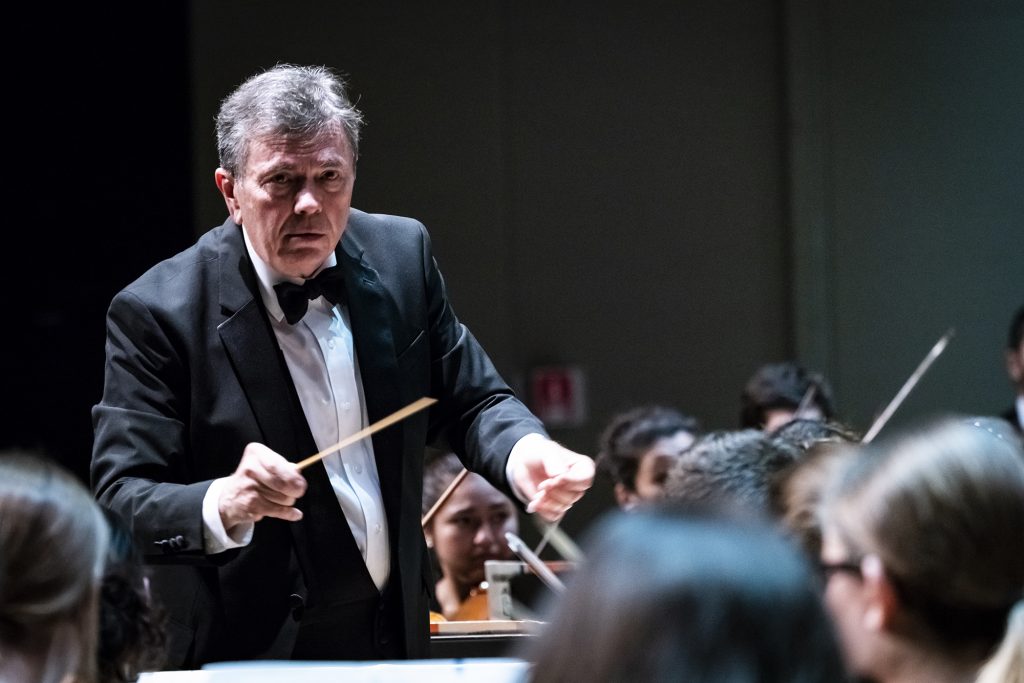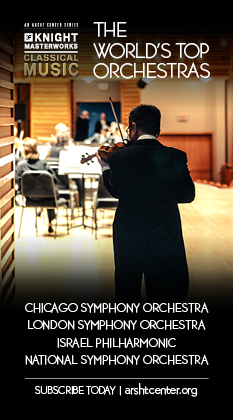Schwarz leads fiery Rachmaninoff, and young soloists take the FSO spotlight

Gerard Schwarz conducted the Frost Symphony Orchestra in Rachmaninoff’s Symphonic Dances Saturday night.
Gerard Schwarz consistently demonstrates the ability to make even the most often-played symphonic repertoire sound fresh and revitalized.
His energized reading of Rachmaninoff’s Symphonic Dances with the Frost Symphony Orchestra Saturday night at UM Gusman Concert Hall found Schwarz and the student musicians in top form. Far from sounding like a college effort, the performance would have done credit to many professional regional American orchestras.
Schwarz’s taut pacing and clipped phrasing of the initial subject in the first movement of Rachmaninoff’s orchestral swan song set the mood and trajectory of this high-intensity reading. The saxophone solo, played by Noah Brisson, resounded in rounded, full tones and the sensuous melody was given rich fervor by the voluminous strings.
Concertmaster Joao Felipe Da Fraga’s solo at the outset of the second movement Tempo di valse emerged with a rich vibrato, embodying the aura of the dark waltz that follows. Schwarz took a faster tempo than many conductors in this section while underlining the music’s somber undercurrents.
He brought out the terror of the opening of the third movement with the succeeding Allegro vivace nearly unhinged in its fiery propulsion. The brass intoned the Dies irae and the counter chorale from Rachmaninoff’s All Night Vigil with gleam and solidity. Throughout the performance, Schwarz’s lucid detailing allowed individual lines and timbres of the orchestral fabric that are usually obscured to emerge with clarity. The manic fervor of the coda capped a thrilling iteration that displayed conductor and orchestra at their best.
While the Rachmaninoff performance was the program’s crowning achievement, the concert’s first half offered some fine music making as well. Two winners of the Frost School of Music’s concerto competition were soloists with two graduate conductors helming the podium.
Cellist Arianna Charran had the technical demands of Bruch’s Kol Nidre well in hand. Producing a large sonority, she shaped the prayer-like melody with appropriately eloquent solemnity. Yun Xuan Cao led a well-balanced accompaniment.
Michael Wu was the soloist in Samuel Barber’s Violin Concerto. Wu immediately displayed his precise style in the soaring theme that opens the first movement. His lean, compact tone avoided sentimental excess but the Allegro proceeded at a low boil, and was wanting greater ardor.
Wu came into his own with the Andante bringing real fervor to Barber’s. The Presto finale (which some early performers thought unplayable) held no problems for Wu who was fully equal to its challenges. Bowing at rapid speed, he drew clear intonation from his instrument.
Sophie Sze-Ki Mok conducted with total command of Barber’s sonic palette and neo-romantic idiom while exhibiting strong collaborative skills. Clarinet and oboe solos were assayed with beauty of tone and adroit musicianship.
Schwarz opened the concert with a cleanly articulated performance of Richard Strauss’s Till Eulenspiegel’s Merry Pranks. Drawing accuracy from the crucial horn and trumpet contingent, he emphasized sharp contrasts in tempo and dynamics. Schwarz evoked the mock seriousness of Strauss’ portrait of a prankster, his tragic end and possible rebirth while coordinating unanimity and strength of ensemble playing.
Gerard Schwarz conducts the Frost Symphony Orchestra in works by Augusta Read Thomas, Bernard Rands, Daron Hagen and Chen Yi, and Beethoven’s Symphony No. 9 7:30 p.m. April 27 at UM Gusman Concert Hall. music.um.edu
Posted in Performances
Leave a Comment
Sun Mar 31, 2024
at 11:45 am
No Comments



